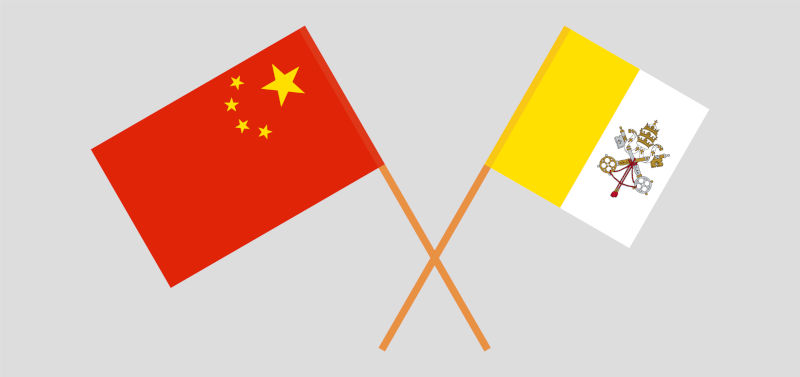Does the Vatican's road to Beijing run through Hong Kong?
April 25, 2023
An invitation to visit Beijing was issued late last year to Stephen Chow, Sau-yan, the Catholic Bishop of Hong Kong. His recently completed visit is the first by a Catholic Bishop of Hong Kong to the Mainland since the recovery of Hong Kong by China in July, 1997. It may help provide a strengthened framework for the continuing dialogue between the Vatican and Beijing as they each proceed with their diplomatic long-game.
Readers will recall that the US Secretary of State, Antony Blinken, was set to visit Beijing when a high-altitude balloon originating from China entered American air space early this year. Swiftly labelled a spy-balloon by the US, Blinken crossly announced, at the time, that he was cancelling his China trip. One leading Washington commentator subsequently argued that the US response was irrational.
Since the hullaballoon incident, the US has wound up the volume on its Sino-offensive with intensified blame-China accusations, the Tik Tok Congressional Inquisition and, of course, still more unilateral sanctions, interspersed with claims from, for example, US Treasury Secretary Janet Yellen that better China-US relations are desired. The local media in Hong Kong report that, more recently, Mr. Blinken has issued an invitation to China to re- invite Mr Blinken to visit Beijing. Dealing with the US has become still more exasperating in 2023. This invitation-to-invite has, so far, failed to prompt the response desired.
Another invitation to visit Beijing was issued late last year, this time to Bishop Stephen Chow, Sau-yan, a Jesuit priest prior to being appointed Bishop of Hong Kong by the Vatican in May 2021. The invitation, issued by the Bishop of Beijing, Joseph Li, Shan, was welcomed and Bishop Chow has just completed a successful five-day visit to the capital. This is the first visit by a Catholic Bishop of Hong Kong to the Mainland since the end of the British Hong Kong era and the recovery of Hong Kong by China in July, 1997
The Vatican remains one of the 13 jurisdictions worldwide (out of over 190) which still recognise the Republic of China, based in Taiwan, as the legitimate government of China. Though the divergences which stand between them remain clear, both the Vatican and Beijing have strong reasons to repair their estranged relationship. For the Vatican, it is anomalous not to have diplomatic relations with Beijing, given the size and importance of China. For Beijing, securing diplomatic recognition from the Vatican would be geopolitically significant on several levels. In a move seen as a step towards regularising their relationship, the Vatican and Beijing, in 2018, forged a provisional agreement, renewed in October 2022, on the appointment of Bishops in China. The agreement has generally worked well but not un-controversially.
The formal Catholic Church in China operates within the controlling state-ambit of the Chinese Catholic Patriotic Association, headed by Bishop Li. The informal, underground Catholic Church, which sees the Pope as its ultimate head, also continues to operate. Together, these two branches minister to around 12 million Catholics in China.
Bishop Joseph Zen, Ze-kiun became Bishop of Hong Kong in 2002 and remained so until his retirement in 2009. He was made a Cardinal in 2006. Bishop Zens hostility toward the Communist Party of China intensified over time. Hong Kong commenter, Alex Lo, argued convincingly that, under Bishop Zens leadership both as Bishop and after retirement, a substantial segment of the church was politicised and for a time functioned like an opposition party in Hong Kong. As a consequence of claimed active linkages with certain opposition militants during the 2019 insurrection (which grew out of a series of peaceful protest marches) Bishop Zen has been charged with breaching Hong Kongs new National Security Law. For some he is a 90 Year Old Champion of Freedom who has been wrongly arrested and charged.
Bishop Zen and a range of other Catholics around the world, including some senior clergy, have expressed open, regularly vehement, hostility to the 2018 agreement between the Vatican and Beijing. However, the Vatican, while not under-estimating the challenges, appears committed to maintaining and, where possible, enlarging the dialogue with Beijing. Both parties understand that they are engaged in a process of extended, complex negotiations.
Bishop Chow understands this, too. He stressed that it was right to love both the country and the church, when he spoke at a mass in Beijing, noting that, Everyone would like to see their own country doing well, no one wants it to do badly. He invited the Bishop of Beijing to visit Hong Kong and expressed the hope that further exchanges between the churches in Hong Kong and the Mainland would follow.
Associate-Professor Kung, Lap-yan, a theologian based at the Chinese University of Hong Kong, believes that the Catholic Church in Hong Kong is now actively fostering enhanced relations with the Catholic Church in China. If more structural communication and substantive foundations can be put in place, these should provide a strengthened framework for the continuing elevated dialogue between the Vatican and Beijing as they each proceed with their long-game.
It is clear that the previous glaring animosity directed by the Hong Kong Catholic Church towards Beijing and vice versa is now out of favour on both sides of the border. We must hope that it stays this way. There is no sign, incidentally, of any substantial glaring let-up from Washington, nor of a fresh invitation, yet, for Mr. Blinken to visit Beijing.

